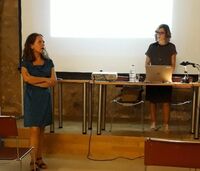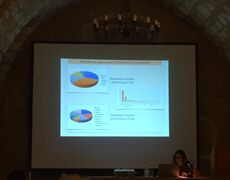Winners 2018/19
Angela Cinalli – Scientific Report
AIEGL – Societas Internationalis Epigraphiae Graecae et Latinae
2018-2019 Géza Alföldy – Research Grant Report
Dr. Angela Cinalli
Scientific Report
- Research theme: “Following the path of itinerant professionals of literature and music of the Hellenistic Period. The case study of Crete”
- Host Institution: University of Crete, Department of Philology, Section of Classical Studies
- Period of the Research Grant: 20/08/2018–20/09/2018
 During the month of study and research spent at the Department of Classical Studies of the University of Crete, I had the possibility to carry on the Cretan section of my project on the itinerant professionals of the arts in the epigraphic sources of the Hellenistic Period. I was also able to draw an overall vision of the whole Aegean area, analyzing the testimonies on a quantity base and by selected typological categories. The results of my study, which I plan to publish very soon, were presented at the lecture I held at the Institute of Mediterranean Studies in Rhetymno, on the 12th of September. Many, among students and colleagues of the Department, took the chance to participate and share with me their opinions, engaging constructive debate in that and other occasions. My study also benefitted from the good working conditions provided by the Host Institution and from the constant presence of Melina Tamiolaki, my reference Professor, whom I am extremely grateful for creating contacts with local Institutions and guiding me throughout the territory. I had the possibility to study de visu the Cretan inscriptions of my interest and I thank the staff of the Museum of Heraklion for being very collaborative in hosting me and allowing me to work in the repository.
During the month of study and research spent at the Department of Classical Studies of the University of Crete, I had the possibility to carry on the Cretan section of my project on the itinerant professionals of the arts in the epigraphic sources of the Hellenistic Period. I was also able to draw an overall vision of the whole Aegean area, analyzing the testimonies on a quantity base and by selected typological categories. The results of my study, which I plan to publish very soon, were presented at the lecture I held at the Institute of Mediterranean Studies in Rhetymno, on the 12th of September. Many, among students and colleagues of the Department, took the chance to participate and share with me their opinions, engaging constructive debate in that and other occasions. My study also benefitted from the good working conditions provided by the Host Institution and from the constant presence of Melina Tamiolaki, my reference Professor, whom I am extremely grateful for creating contacts with local Institutions and guiding me throughout the territory. I had the possibility to study de visu the Cretan inscriptions of my interest and I thank the staff of the Museum of Heraklion for being very collaborative in hosting me and allowing me to work in the repository.
As for the reconstruction of itinerant arts in Crete, epigraphic testimonies are quite scattered if compared to other Aegean areas (e.g. Rhodes or Delos) and by chance diverging from literary sources that instead have always put Crete on apical position. Nonetheless, various elements allow us to speculate enough and gain a satisfactory vision of the Hellenistic performative life of this island. Each place has and shows its characteristics and specificities in artistic taste, that seems tied up to local traditions and cultural heritage and also to all-the-rage arts. In Crete, epigraphy attests to preference for comedy, dance, and auletic music. More than any other areas I had the chance to visit for my research, Cretan territory and archaeological data see eye to eye with epigraphic documents.
This research grant allowed me to complete the reconstruction of a significant fragment of a long journey of the arts that awaits for other tesserae to be located and I am extremely grateful to the AIEGL for granting me the opportunity to fulfill this goal.

